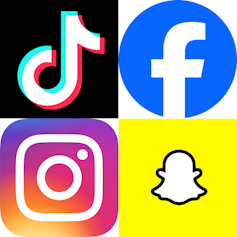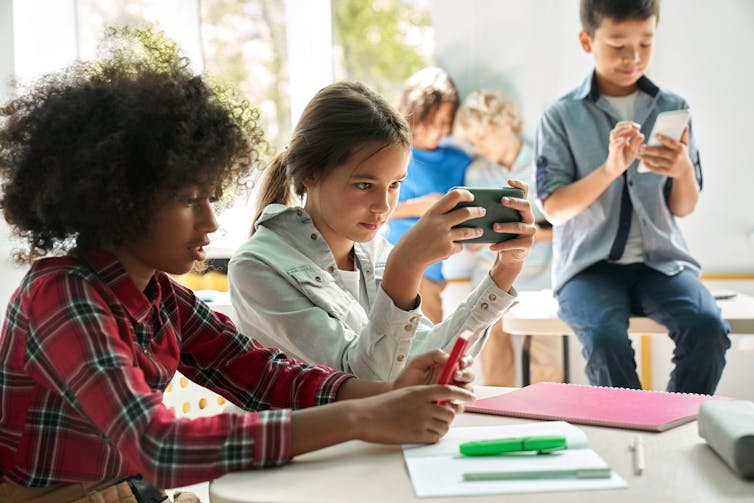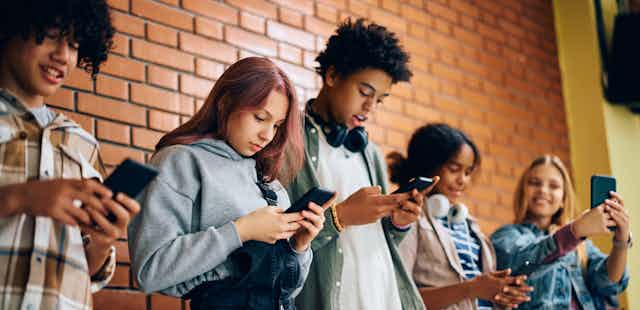Recently, five school boards in Ontario filed a lawsuit against the major social media platforms: Facebook and Instagram, Snapchat and TikTok.
Their lawsuit says that these platforms are designed to be addictive and have caused all kinds of problems for the education system. The lawsuit says social media causes children to suffer from mental health issues, and it increases distraction, social withdrawal, and cyberbullying. And it causes damage and disruption to the classroom, putting all kinds of new burdens on teachers who are already dealing with shrinking budgets and increased class sizes.
The $4.5 billion lawsuit follows over 200 lawsuits by school boards in the United States in the past year against the same companies, making similar claims.
This week, the Ontario government, which has called the Canadian lawsuit a waste of time and money, announced it was doubling down on its 2019 ban on cellphones in schools as a way to address the problem.
But is a ban the answer to the impact of technology we know is incredibly pervasive, addictive and harmful? Not to mention, often racist?
Research shows technologies are not neutral: They’re embedded with and actively reinforce structures of racism. A survey of Canadian children in grades 7 to 11 found nearly half of participants reported seeing racist or sexist content online, and youth from marginalized groups were more likely than others to encounter this type of content. So, what’s to be done?

On this week’s Don’t Call Me Resilient podcast, our guests are two scholars and former teachers who look at the intersection of race, technology and education. They say social media has become part of who we are and it’s not going anywhere.
Instead of trying to ban it and monitoring students to make sure they adhere to the ban, schools should focus on improving digital media literacy and critical thinking — for students and their teachers.
Beyhan Farhadi is Assistant Professor of Educational Policy and Equity at the Ontario Institute for Studies in Education, University of Toronto and Kisha McPherson is an Assistant Professor in the School of Professional Communication at Toronto Metropolitan University.
“How can we effectively use [the cellphone] within the classroom? It could be a research tool… it could be a pedagogical tool to teach and to do different things. With the money that is put towards these surveillance measures and put towards these forms of punitive decisions…it really begs the question of whether or not we’re really concerned about students or are we just finding ways to maintain a status quo of control….” – Kisha McPherson, Assistant Professor, Toronto Metropolitan University
Resources
Race After Technology: Abolitionist Tools for the New Jim Code (by Ruha Benjamin, 2019)
Algorithms of Oppression: How Search Engines Reinforce Racism (by Safiya Umoja Noble, 2018)
“Digital Dystopia: The Danger in Buying What the EdTech Surveillance Industry is Selling” (The American Civil Liberties Union)
The Social Dilemma (Netflix/Documentary)

From the archives – in The Conversation
Read more: School board social media lawsuits: For too long we’ve sought individual solutions to a collective problem
Read more: Why Ontario school boards are suing social media platforms for causing an attention crisis
Read more: Banning cellphones in classrooms is not a quick fix for student well-being
Read more: Research on teen social media use has a racial bias – studies of white kids are widely taken to be universal
Listen and follow
You can listen to or follow Don’t Call Me Resilient on Apple Podcasts (transcripts available), Spotify, YouTube or wherever you listen to your favourite podcasts.
We’d love to hear from you, including any ideas for future episodes.
Join the Conversation on Instagram, X, LinkedIn and use #DontCallMeResilient.
